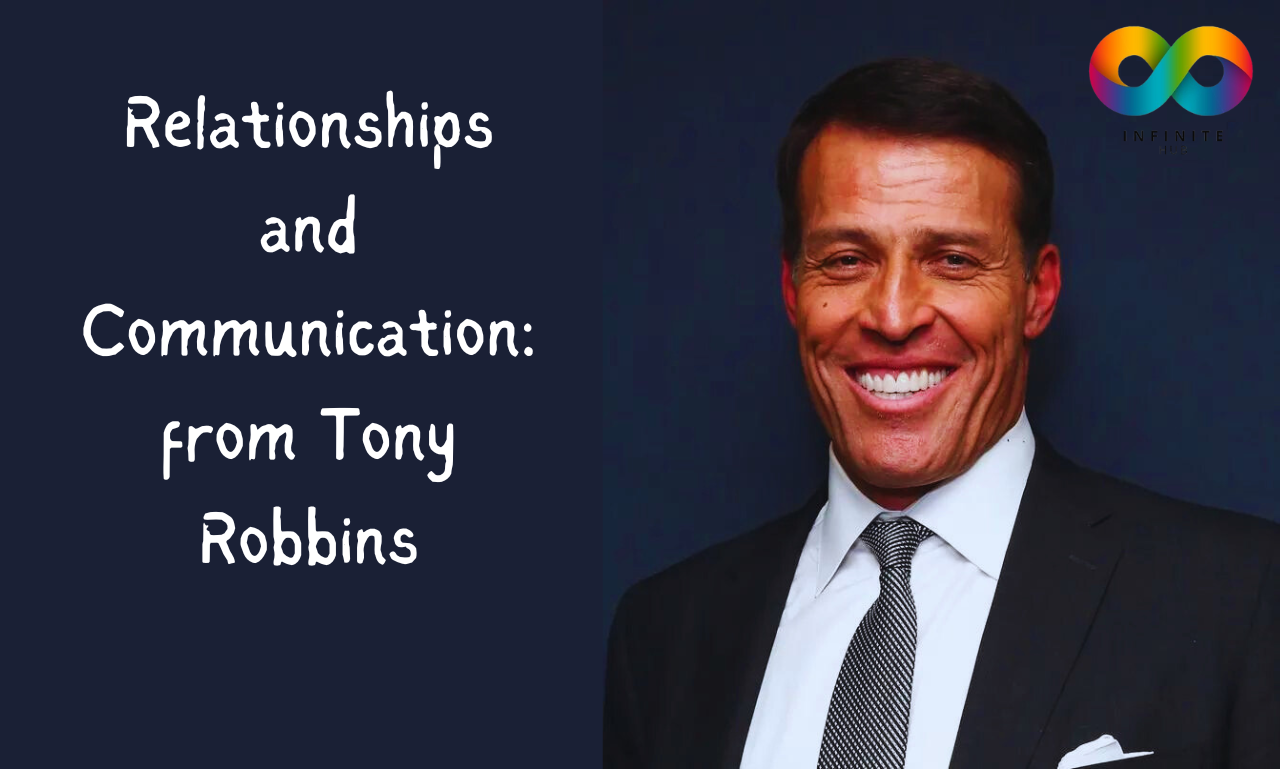Tony Robbins, the world-renowned life coach and motivational speaker, has impacted millions with his insights into personal development, leadership, and relationships. One of his core teachings revolves around the importance of relationships and communication. Robbins believes that the quality of our relationships directly impacts the quality of our lives. In this blog, we will delve into Tony Robbins’ principles on relationships and communication, exploring how these concepts can transform our personal and professional interactions.
Understanding the Importance of Relationships
Tony Robbins often emphasizes that human beings are inherently social creatures. Our relationships form the bedrock of our emotional well-being and overall happiness. Whether it’s with family, friends, or colleagues, the connections we nurture can profoundly affect our life satisfaction. Robbins argues that:
- Relationships Are a Source of Fulfillment: He posits that true fulfillment in life comes from meaningful connections. Material success or career achievements alone are not enough to lead a fulfilling life; it’s the relationships we build that add depth and meaning.
- Relationships Require Continuous Effort: Robbins underscores that healthy relationships are not built overnight. They require continuous effort, understanding, and compromise. Investing time and energy into relationships can yield significant returns in terms of emotional support and personal growth.
- Variety in Relationships: He also highlights the importance of having a variety of relationships. Each relationship serves a different purpose – some provide comfort and stability, while others offer excitement and adventure. A balanced mix is essential for a well-rounded emotional life.
The Foundation of Effective Communication
Central to Tony Robbins’ teachings is the idea that effective communication is the cornerstone of strong relationships. Without clear and empathetic communication, even the strongest bonds can weaken over time. Robbins provides several key strategies for enhancing communication:
- Active Listening: One of the most critical components of effective communication is active listening. This involves fully concentrating on what the other person is saying without formulating a response while they are speaking. Robbins suggests that active listening fosters empathy and understanding, making the other person feel valued and heard.
- Non-Verbal Communication: Robbins points out that communication is not just about words. Non-verbal cues, such as body language, facial expressions, and eye contact, play a crucial role in conveying emotions and intentions. Being mindful of these cues can significantly improve the quality of our interactions.
- Authenticity: Authenticity in communication means being genuine and honest in expressing one’s thoughts and feelings. Robbins believes that authenticity fosters trust and openness in relationships. People are more likely to connect deeply when they feel they are interacting with someone who is sincere.
- Clarity and Conciseness: Clarity in communication prevents misunderstandings and conflicts. Robbins advises being concise and clear in expressing thoughts to ensure the message is understood as intended. Avoiding ambiguity and vagueness can help maintain harmony and reduce friction.
Emotional Intelligence in Relationships
Tony Robbins often speaks about the role of emotional intelligence (EQ) in building and maintaining healthy relationships. Emotional intelligence involves understanding and managing one’s emotions and being attuned to the emotions of others. High EQ can enhance communication and strengthen relationships in the following ways:
- Self-Awareness: Understanding one’s emotions is the first step towards effective communication. Robbins emphasizes the importance of recognizing and acknowledging our feelings before communicating them. This self-awareness helps in expressing emotions constructively rather than reactively.
- Empathy: Empathy is the ability to understand and share the feelings of others. Robbins argues that empathetic communication is crucial for building trust and rapport. It allows us to connect with others on a deeper level and fosters mutual respect and understanding.
- Conflict Resolution: High emotional intelligence also aids in resolving conflicts. Robbins teaches that viewing conflicts as opportunities for growth rather than threats can lead to more positive outcomes. Approaching disagreements with a calm and open mindset, and focusing on finding common ground, can strengthen relationships rather than weaken them.
Building and Sustaining Intimate Relationships
Intimate relationships, whether with a partner or close family members, require special attention and care. Tony Robbins offers specific advice for nurturing these deep connections:
- Prioritizing the Relationship: Robbins suggests that in intimate relationships, it’s crucial to prioritize the relationship over individual egos. This means making the relationship a central focus and ensuring that both partners feel valued and appreciated.
- Effective Conflict Management: Disagreements are inevitable, but how they are managed makes all the difference. Robbins advises addressing conflicts directly but with compassion and a willingness to understand the other person’s perspective. This approach prevents resentment and builds a stronger bond.
- Maintaining Passion and Connection: For romantic relationships, Robbins emphasizes the importance of maintaining passion and connection. This involves making time for each other, showing affection, and keeping the romance alive through small gestures of love and appreciation.
- Shared Goals and Values: Having shared goals and values can strengthen intimate relationships. Robbins encourages couples to discuss and align their long-term visions and values. This alignment provides a solid foundation for the relationship and helps navigate challenges together.
Enhancing Professional Relationships
The principles of effective communication and strong relationships apply equally in professional settings. Tony Robbins offers valuable insights for enhancing workplace relationships:
- Building Trust and Respect: Trust and respect are the cornerstones of professional relationships. Robbins advocates for transparent communication, consistency, and integrity to build a trustworthy reputation. Respecting colleagues’ ideas and contributions fosters a positive and collaborative work environment.
- Effective Team Communication: In a team setting, clear and open communication is essential. Robbins suggests regular check-ins, feedback sessions, and creating an inclusive atmosphere where everyone feels heard. This leads to better teamwork and increased productivity.
- Leadership Through Communication: For leaders, Robbins stresses the importance of inspiring and motivating through communication. This involves not only giving clear directions but also listening to team members, understanding their needs, and providing support.
- Conflict Resolution in the Workplace: Just as in personal relationships, conflicts in the workplace should be approached with a problem-solving mindset. Robbins recommends addressing issues promptly, focusing on facts rather than emotions, and striving for mutually beneficial solutions.
Conclusion
Tony Robbins’ insights into relationships and communication offer a comprehensive guide to enhancing our interactions with others. By prioritizing relationships, practicing effective communication, and developing emotional intelligence, we can build deeper, more meaningful connections in all areas of our lives. Whether in personal or professional settings, these principles can lead to more fulfilling and harmonious relationships, ultimately enriching our overall life experience. Robbins’ teachings remind us that the quality of our relationships is a significant determinant of our happiness and success, making it imperative to invest time and effort into nurturing them.



